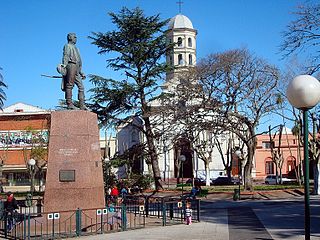Related Research Articles

Juan Carlos I is a member of the Spanish royal family who reigned as King of Spain from 22 November 1975 until his abdication on 19 June 2014. In Spain, since his abdication, Juan Carlos has usually been referred to as the rey emérito.

Felipe VI is King of Spain.

The monarchy of Spain or Spanish monarchy is the constitutional form of government of Spain. It consist of a hereditary monarch that reigns as the head of state, being the highest office of the country. The current monarch is Felipe VI since 19 June 2014, after the abdication of his father, King Juan Carlos I.

Juan Nepomuceno Carlos Pérez Rulfo Vizcaíno, best known as Juan Rulfo, was a Mexican writer, screenwriter, and photographer. He is best known for two literary works, the 1955 novel Pedro Páramo, and the collection of short stories El Llano en llamas (1953). This collection includes the popular tale "¡Diles que no me maten!".

Martín Fernández de Navarrete y Ximénez de Tejada, was a Spanish noble, grandson of the Marquess of Ximenez de Tejada, knight of the Order of Malta, politician and historian. He was a Spanish senator and Director of the Spanish Royal Academy of History (1824-1844).

Ismael Montes Gamboa was a Bolivian general and political figure who served as the 26th president of Bolivia twice nonconsecutively from 1904 to 1909 and from 1913 to 1917. During his first term, the Treaty of Peace and Friendship with Chile was signed on October 20, 1904.

The Uruguayan Air Force is the air service branch of the Armed Forces of Uruguay. Originally created as part of the National Army of Uruguay, the Air Force was established as a separate branch on December 4, 1953. It is the youngest and also the smallest branch of the Armed Forces of Uruguay. In 1977 it was determined that the mission of the Air Force is to conduct strategic and tactical aerospace operations on behalf of the national defense, exercising the sovereignty of the Uruguayan airspace and defending the independence, integrity, constitution and laws of the country. The Air Force must also conduct search and rescue missions and plan, propose, execute and supervise the necessary measures for the development of the aerospace potential, while providing any necessary and possible logistical support during the natural disasters that the country may suffer. Since 1985 this has been always carried out under the command of the President of Uruguay, and according to the Minister of National Defense.

Leonor, Princess of Asturias is the heir presumptive to the throne of Spain as the elder daughter of King Felipe VI and Queen Letizia.

José Manuel Inocencio Pando Solares was a Bolivian soldier and explorer who served as the 25th President of Bolivia from 1899 to 1904. During his government, the Acre War (1899-1903) began, in which Bolivia clashed with Brazil.

Eduardo Noriega Gómez is a Spanish actor. He gained notoriety in Spain for his performance in Thesis (1996), which was followed by roles in Open Your Eyes (1997) and The Wolf (2004).

Laura Mañá Alvarenga is an actress, film director and screenwriter. She was born in Barcelona. As an actress, she has worked for directors such as Bigas Luna or Vicente Aranda. In 1997 she directed Paraules, her first short film and in 2000 her first feature film, Sexo por compassion, selected at the Sundance and Toronto film festivals and awarded at the Malaga Film Festival and at the Festival de Miami, among others.

Severo Fernández Alonso Caballero was a Bolivian lawyer and politician who served as the 24th president of Bolivia from 1896 to 1899 and as the tenth vice president of Bolivia from 1892 to 1896. He is best remembered as the last president of the 15-year period of Conservative Party hegemony (1884–99).

Juan Manuel Santos Calderón is a Colombian politician who was the President of Colombia from 2010 to 2018. He was the sole recipient of the 2016 Nobel Peace Prize.

Pando is a city in the Canelones Department of Uruguay. It is an important commercial and industrial centre which has become part of the wider Montevideo metropolitan area.

Luigi Domenico Gismondi was an Italian prolific photographer, photographic-supplies vendor, and postcard publisher active in Bolivia and the areas of southern Peru and northern Chile. Gismondi was a pioneer in photography in Bolivia, documenting various cultural aspects and numerous personalities while at the same time creating a comprehensive exhibit of regional architecture and geography. The Gismondi archive is notable for being one of the first to include a wide array of photographs of indigenous people from different regions.

Maixabel is a 2021 Spanish drama film directed by Icíar Bollaín and co-written by Bollaín and Isa Campo. The film stars Blanca Portillo and Luis Tosar alongside Bruno Sevilla, Urko Olazabal and María Cerezuela and is based on the true story of Maixabel Lasa, a woman whose husband, Juan María Jáuregui, was killed by ETA, a Basque separatist group, and who receives an invitation to talk with the killers of her husband eleven years after.

Herbert Salvatierra Becerra is a Bolivian lawyer and politician who served as a member of the Chamber of Deputies from Pando, representing circumscription 66 from 2010 to 2015. Salvatierra pertains to a generation of conservative parliamentarians who entered the political arena in the heat of the conflicts of the late 2000s, agitating for regional autonomy for the eastern departments and pushing for the rejection of the new, progressive Constitution ratified during the first Evo Morales administration. Polarization over these issues reached its breaking point in Pando, resulting in the Porvenir massacre, which dealt a heavy blow to the department's opposition-controlled prefecture and civic committee. In the aftermath, Salvatierra was propelled to the presidency of the reconstituted Pando Civic Committee, remaining an ally of the department's jailed prefect, Leopoldo Fernández, for the duration of his political career.
References
- ↑ "Juan Pando: Historia secreta de Annual". Sociedad Benéfica de Historiadores Aficionados y Creadores (in Spanish). Retrieved 9 August 2010.
- ↑ "Bi-national block of the Pando Archive". Spanish Historical Heritage Institute. Archived from the original on 15 December 2009. Retrieved 9 August 2010.
Much of the content of this article comes from the equivalent Spanish-language Wikipedia article, accessed April 11, 2006.